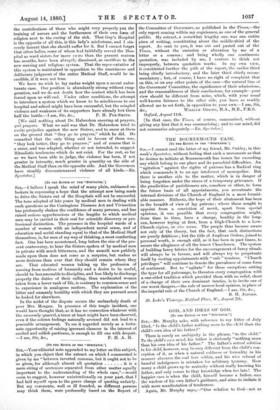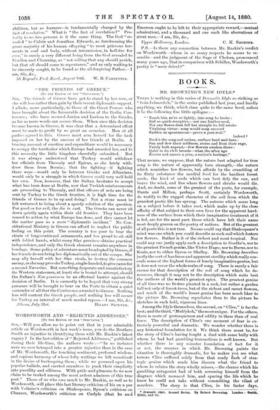GOD, AND IDEAS OF GOD. [TO THE EDITOR or THE
"SPECTATOR.") SIR,—Mr. Murphy asks, with reference to my letter of July 22nd, "Is the child's father nothing more to the child than the child's own idea of his father!"
There is surely an ambiguity in the phrase, "to the child." To the child's own mind, his father is obviously "nothing more than his own idea of his father." The father's actual relation to his child, however, may be very different from the child's con- ception of it, as when a natural coldness or formality in his manner obscures the real love within, and his wise refusal of baneful indulgences is mistaken for arbitrary tyranny. How many a child grows up to maturity without really knowing his father, and only comes to that knowledge when too late ! The happier case is when the child, himself become a father, sees the wisdom of his own father's guidance, and aims to imitate it with more manifestation of tenderness.
Again, Mr. Murphy says,—" Our relation to God—not as
children, but as learners—is fundamentally changed by the fact of revelation." What is "the fact of revelation P" Pro- bably to no two persons is it the same thing. The God " re- veal( d " to Calvin and Jonathan Edwards, as foredooming the great majority of his human offspring " to most grievous tor- ments in soul and body, without intermission, in hell-fire for ever," is surely a very different being from the God revealed to Fenelon and Channing, as " not willing that any should perish, but that a2/ should come to repentance," and as only waiting to be sincerely sought, to be found as the all-forgiving Father.—I am, Sir, &c.,
56 Regent's Park Road, August lOth. W. B. CARPENTER.































 Previous page
Previous page